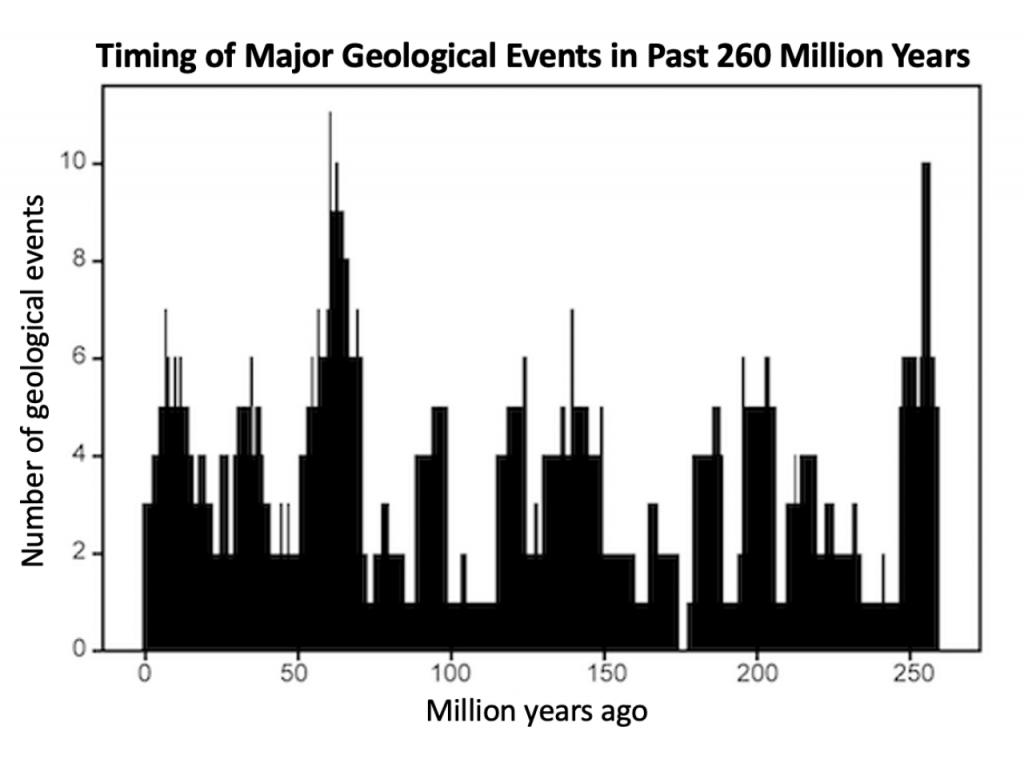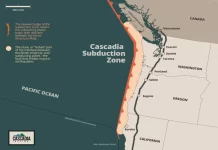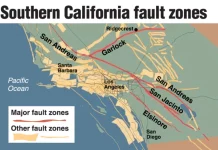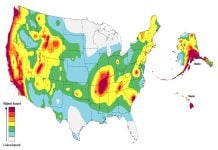Geologic activity on Earth appears to follow a 27.5-million-year cycle, giving the planet a ‘pulse.’

“Many geologists believe that geological events are random over time. But our study provides statistical evidence for a common cycle, suggesting that these geologic events are correlated and not random,“ said Michael Rampino, a geologist and professor in New York University’s Department of Biology, as well as the study’s lead author.
Over the past five decades, researchers have proposed cycles of major geological events — including volcanic activity and mass extinctions on land and sea — ranging from roughly 26 to 36 million years. But early work on these correlations in the geological record was hampered by limitations in the age-dating of geologic events, which prevented scientists from conducting quantitative investigations.
However, there have been significant improvements in radio-isotopic dating techniques and changes in the geologic timescale, leading to new data on the timing of past events. Using the latest age-dating data available, Rampino and his colleagues compiled updated records of major geological events over the last 260 million years and conducted new analyses.
The team analyzed the ages of 89 well-dated major geological events of the last 260 million years. These events include marine and land extinctions, major volcanic outpourings of lava called flood-basalt eruptions, events when oceans were depleted of oxygen, sea-level fluctuations, and changes or reorganization in the Earth’s tectonic plates.
They found that these global geologic events are generally clustered at 10 different timepoints over the 260 million years, grouped in peaks or pulses of roughly 27.5 million years apart. The most recent cluster of geological events was approximately 7 million years ago, suggesting that the next pulse of major geological activity is more than 20 million years in the future.
The researchers posit that these pulses may be a function of cycles of activity in the Earth’s interior — geophysical processes related to the dynamics of plate tectonics and climate. However, similar cycles in the Earth’s orbit in space might also be pacing these events.
“Whatever the origins of these cyclical episodes, our findings support the case for a largely periodic, coordinated, and intermittently catastrophic geologic record, which is a departure from the views held by many geologists,” explained Rampino.
Here the abstract of the new scientific research:
We performed spectral analyses on the ages of 89 well-dated major geological events of the last 260 Myr from the recent geologic literature. These events include times of marine and non-marine extinctions, major ocean-anoxic events, continental flood-basalt eruptions, sea-level fluctuations, global pulses of intraplate magmatism, and times of changes in seafloor-spreading rates and plate reorganizations. The aggregate of all 89 events shows ten clusters in the last 260 Myr, spaced at an average interval of ~ 26.9 Myr, and Fourier analysis of the data yields a spectral peak at 27.5 Myr at the ≥ 96% confidence level. A shorter period of ~ 8.9 Myr may also be significant in modulating the timing of geologic events. Our results suggest that global geologic events are generally correlated, and seem to come in pulses with an underlying ~ 27.5-Myr cycle. These cyclic pulses of tectonics and climate change may be the result of geophysical processes related to the dynamics of plate tectonics and mantle plumes, or might alternatively be paced by astronomical cycles associated with the Earth’s motions in the Solar System and the Galaxy.
Now subscribe to this blog to get more amazing news curated just for you right in your inbox on a daily basis (here an example of our new newsletter).
You can also follow us on Facebook and/ or Twitter. And, by the way you can also make a donation through Paypal. Thank you!













Well the dummycrats and communist heathen buttclowns think globull warming will kill us in a few more years.
So there goes that baloney con job right out the window.
me thinks the taurus jet may be revving up. NO big deal, the earth is just body surfing in the waves.
Let’s get this in perspective, so in the last 288million years there’s been 10 of these 27.5million year cycles.
Besides that, we’ve had exactly 24000 cycles of our 12000 year earth cycle over the last 288million years that involve major tectonic activity as well as major ice ages, how coincidental is that, numbers don’t lie, ha Tesla had it sussed! Frequency and numbers, frequency and numbers lol?